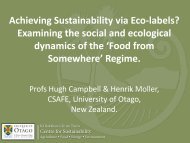Book of Abstract (incl. addendum) - IFSA symposium 2012
Book of Abstract (incl. addendum) - IFSA symposium 2012
Book of Abstract (incl. addendum) - IFSA symposium 2012
Create successful ePaper yourself
Turn your PDF publications into a flip-book with our unique Google optimized e-Paper software.
Workshop 5.3 Research-Education-Action platform for land management and territorial<br />
development<br />
Analyzing research practices <strong>of</strong> education experiences for agriculture and<br />
territory development<br />
Sylvie Lardon and Christophe Albaladejo<br />
INRA, France<br />
Sylvie.Lardon@gmail.com<br />
An INRA working group <strong>of</strong> researchers and teachers implied in education and training on agriculture<br />
and territory development highlights their practices and the new skills and competences they<br />
developed. They analyze their experiences by asking these questions:<br />
• Action: What are the territorial dynamics involved? Who are the stakeholders? How do they<br />
bring new forms <strong>of</strong> knowledge? How to evaluate the impact <strong>of</strong> research and education on the<br />
territorial processes?<br />
• Education: How to conceive innovative education and training programs in order to develop<br />
new skills? Who is concerned? How to evaluate the educational properties <strong>of</strong> such collective<br />
experiments?<br />
• Research: What are the researcher’s conceptual frameworks? What disciplines are combined?<br />
How to interact in a participatory process with all the actors concerned? How to enhance the<br />
value <strong>of</strong> the produced knowledge?<br />
The analysis <strong>of</strong> ten experiences resulted in a first typology <strong>of</strong> the degree and modalities <strong>of</strong> participation<br />
<strong>of</strong> the researchers and teachers, the students and training persons and the institutional actors, in a<br />
shared partnership for the emergence and the governance <strong>of</strong> innovative processes.<br />
To formalize the contribution <strong>of</strong> education and training to these action-researches and multi<br />
stakolders approaches, we use the five concepts (interdisciplinarity, connection to the field, spatiotemporal<br />
relationship, context dependence adaptation and reflexivity) <strong>of</strong> the Research-Education-<br />
Action platform which could become a collaborative one to conduce the change in agriculture and<br />
territory development.<br />
New skills and competences have to be improved by all the participants (researchers, teachers,<br />
students and training persons, institutional actors) <strong>of</strong> these collective knowledge processes.<br />
Supporting integration and co-development as processes <strong>of</strong> collective action<br />
and learning in catchment management in Australia<br />
Margaret Ayre and Ruth Nettle<br />
University <strong>of</strong> Melbourne, Australia<br />
Mayre@unimelb.edu.au<br />
In this paper we describe the outcomes <strong>of</strong> an action research inquiry into knowledge making as part <strong>of</strong><br />
a large interdisciplinary catchment research project, the Farms, Rivers and Markets (FRM) project.<br />
The FRM Project aimed to integrate academic research and community knowledge/s in the<br />
development <strong>of</strong> new water management options in an agricultural region, the Goulburn-Broken<br />
catchment in north-eastern Victoria, Australia. Key findings <strong>of</strong> this research <strong>incl</strong>ude the dynamics and<br />
processes that support integration amongst diverse disciplinary knowledges, and knowledge<br />
partnerships between integrated research projects and diverse communities <strong>of</strong> practice in agriculture<br />
and water management. We understand action learning to involve coordinating a variety <strong>of</strong> disparate<br />
practices—<strong>incl</strong>uding materials (e.g. objects and ‘things’), textual resources (e.g. written plans and<br />
documents) and social technologies (e.g. groups <strong>of</strong> researchers and stakeholders; theories)—to produce<br />
new knowledge and practices through collaborations. We ask: What kind <strong>of</strong> educational processes<br />
(<strong>incl</strong>uding action learning) support knowledge transfer in research and teaching institutions? In<br />
addressing this question, we describe processes that both planned (part <strong>of</strong> research design) and<br />
emergent (iteratively designed) and are characterised by: collective action, reflection and commitment;<br />
97











